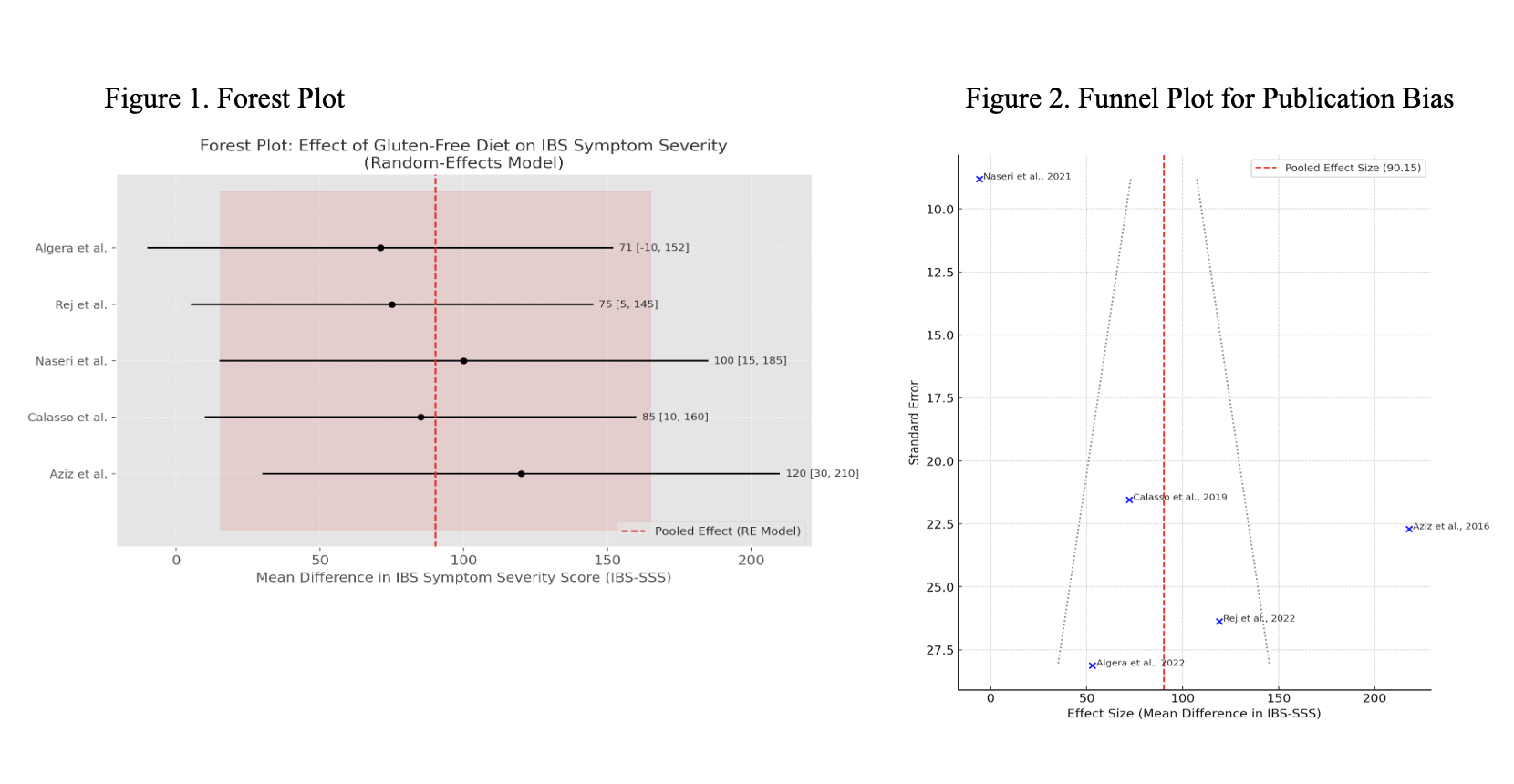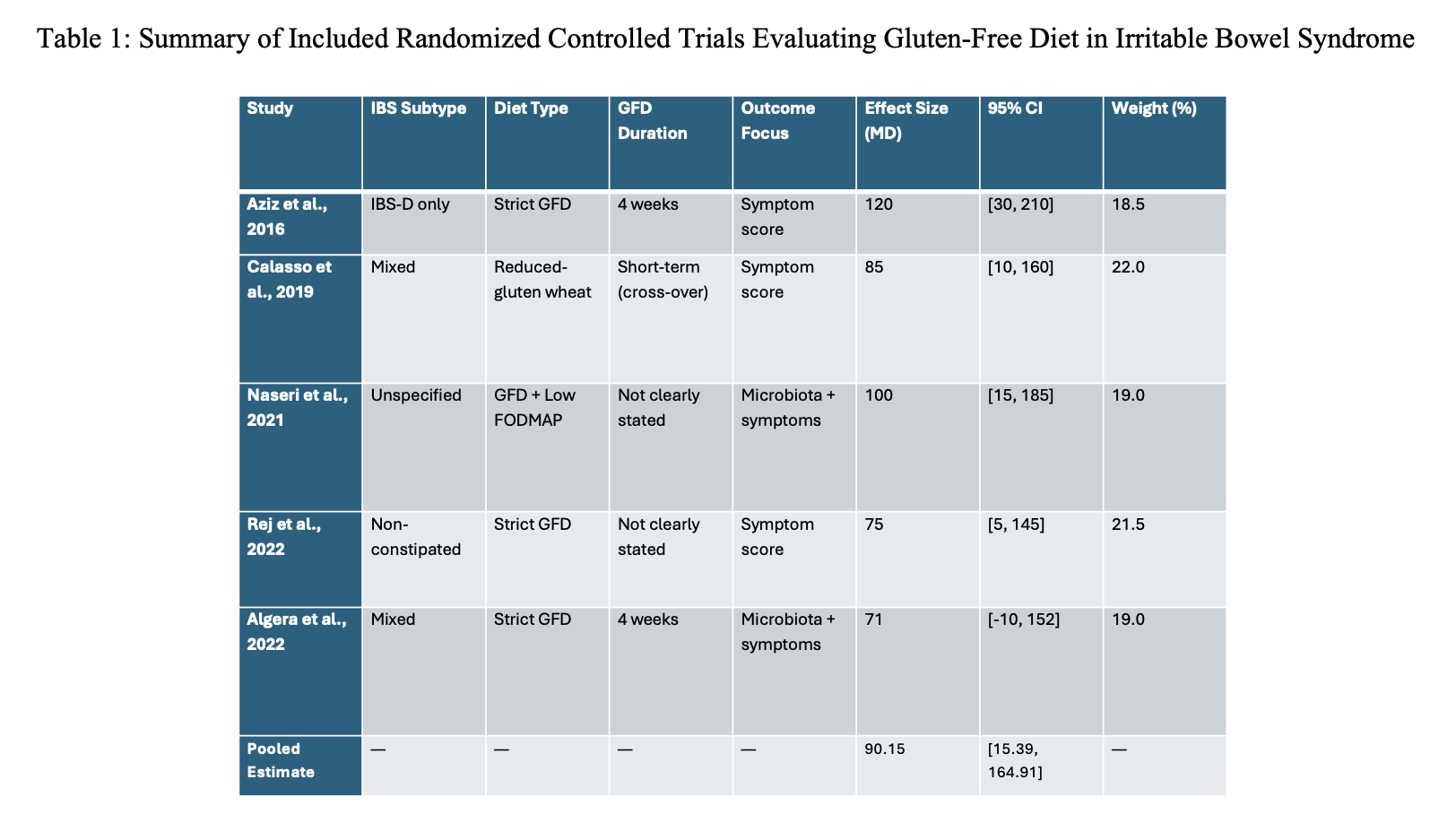Tuesday Poster Session
Category: Functional Bowel Disease
P5058 - Effect of Gluten-Free Diet on Symptom Severity in Irritable Bowel Syndrome: A Meta-Analysis of Randomized Trials
Tuesday, October 28, 2025
10:30 AM - 4:00 PM PDT
Location: Exhibit Hall
- MA
Madia Ahad, MD
SUNY Downstate Health Sciences University
Brooklyn, NY
Presenting Author(s)
Anwar Uddin, MD1, Madia Ahad, MD1, Narinderjeet Kaur, MD, MS1, Ritik M. Goyal, MBBS2, Savanna Thor, DO, MPH1
1SUNY Downstate Health Sciences University, Brooklyn, NY; 2Rutgers New Jersey Medical School, Newark, NJ
Introduction: Irritable bowel syndrome (IBS) is a common gastrointestinal condition characterized by chronic abdominal discomfort and altered bowel habits. Dietary changes, particularly gluten free diets (GFD), have received increasing attention for their potential to ease symptoms. GFD is thought to help individuals with nonceliac gluten sensitivity or heightened intestinal sensitivity to gluten. However, findings across randomized trials have been inconsistent. To address this, we conducted a meta-analysis of randomized controlled trials to evaluate whether GFD improves symptom severity in IBS, using the IBS Symptom Severity Score (IBS-SSS) as the primary outcome.
Methods: A systematic PubMed search identified five randomized controlled trials assessing the effect of GFD on IBS-SSS in adults with clinically diagnosed IBS, totaling 111 participants. Data were pooled using a random effects model. Heterogeneity was evaluated with I², tau squared (τ²), and Cochran’s Q test. A funnel plot was used to assess publication bias.
Results: The pooled analysis showed that GFD significantly reduced symptom severity, with a mean difference in IBS-SSS of 90.15 (95% CI: 15.39 to 164.91, p = 0.018), indicating a clinically meaningful benefit. Substantial heterogeneity was present (I² = 94.7%, τ² = 6769.35, Q = 99.56, p < 0.001), likely due to differences in study design, IBS subtypes, dietary protocols, and population characteristics. For example, Aziz et al. included only IBS-D patients without assessing HLA-DQ2/8 status; Calasso et al. used a reduced-gluten wheat protocol with a cross over design; Naseri et al. combined GFD with low FODMAP in a non-Western cohort; Rej et al. compared GFD to other diets in non-constipated IBS; and Algera et al. incorporated microbiome-focused endpoints. Despite variability, most studies favored gluten restriction. Funnel plot analysis showed symmetrical effect size distribution without strong evidence of publication bias, though the limited number of studies prevents firm conclusions.
Discussion: This meta-analysis demonstrates a statistically and clinically significant association between gluten-free dietary intervention and reduced IBS symptom severity. Although heterogeneity was high across studies, the overall trend supports further investigation of GFD as a therapeutic approach in IBS, particularly in studies stratified by IBS subtype and dietary response profiles.

Figure: Table 1: Summary of Studies

Figure: Figure 1 and 2: Forest Plot and Funnel Plot
Disclosures:
Anwar Uddin indicated no relevant financial relationships.
Madia Ahad indicated no relevant financial relationships.
Narinderjeet Kaur indicated no relevant financial relationships.
Ritik M. Goyal indicated no relevant financial relationships.
Savanna Thor indicated no relevant financial relationships.
Anwar Uddin, MD1, Madia Ahad, MD1, Narinderjeet Kaur, MD, MS1, Ritik M. Goyal, MBBS2, Savanna Thor, DO, MPH1. P5058 - Effect of Gluten-Free Diet on Symptom Severity in Irritable Bowel Syndrome: A Meta-Analysis of Randomized Trials, ACG 2025 Annual Scientific Meeting Abstracts. Phoenix, AZ: American College of Gastroenterology.
1SUNY Downstate Health Sciences University, Brooklyn, NY; 2Rutgers New Jersey Medical School, Newark, NJ
Introduction: Irritable bowel syndrome (IBS) is a common gastrointestinal condition characterized by chronic abdominal discomfort and altered bowel habits. Dietary changes, particularly gluten free diets (GFD), have received increasing attention for their potential to ease symptoms. GFD is thought to help individuals with nonceliac gluten sensitivity or heightened intestinal sensitivity to gluten. However, findings across randomized trials have been inconsistent. To address this, we conducted a meta-analysis of randomized controlled trials to evaluate whether GFD improves symptom severity in IBS, using the IBS Symptom Severity Score (IBS-SSS) as the primary outcome.
Methods: A systematic PubMed search identified five randomized controlled trials assessing the effect of GFD on IBS-SSS in adults with clinically diagnosed IBS, totaling 111 participants. Data were pooled using a random effects model. Heterogeneity was evaluated with I², tau squared (τ²), and Cochran’s Q test. A funnel plot was used to assess publication bias.
Results: The pooled analysis showed that GFD significantly reduced symptom severity, with a mean difference in IBS-SSS of 90.15 (95% CI: 15.39 to 164.91, p = 0.018), indicating a clinically meaningful benefit. Substantial heterogeneity was present (I² = 94.7%, τ² = 6769.35, Q = 99.56, p < 0.001), likely due to differences in study design, IBS subtypes, dietary protocols, and population characteristics. For example, Aziz et al. included only IBS-D patients without assessing HLA-DQ2/8 status; Calasso et al. used a reduced-gluten wheat protocol with a cross over design; Naseri et al. combined GFD with low FODMAP in a non-Western cohort; Rej et al. compared GFD to other diets in non-constipated IBS; and Algera et al. incorporated microbiome-focused endpoints. Despite variability, most studies favored gluten restriction. Funnel plot analysis showed symmetrical effect size distribution without strong evidence of publication bias, though the limited number of studies prevents firm conclusions.
Discussion: This meta-analysis demonstrates a statistically and clinically significant association between gluten-free dietary intervention and reduced IBS symptom severity. Although heterogeneity was high across studies, the overall trend supports further investigation of GFD as a therapeutic approach in IBS, particularly in studies stratified by IBS subtype and dietary response profiles.

Figure: Table 1: Summary of Studies

Figure: Figure 1 and 2: Forest Plot and Funnel Plot
Disclosures:
Anwar Uddin indicated no relevant financial relationships.
Madia Ahad indicated no relevant financial relationships.
Narinderjeet Kaur indicated no relevant financial relationships.
Ritik M. Goyal indicated no relevant financial relationships.
Savanna Thor indicated no relevant financial relationships.
Anwar Uddin, MD1, Madia Ahad, MD1, Narinderjeet Kaur, MD, MS1, Ritik M. Goyal, MBBS2, Savanna Thor, DO, MPH1. P5058 - Effect of Gluten-Free Diet on Symptom Severity in Irritable Bowel Syndrome: A Meta-Analysis of Randomized Trials, ACG 2025 Annual Scientific Meeting Abstracts. Phoenix, AZ: American College of Gastroenterology.
